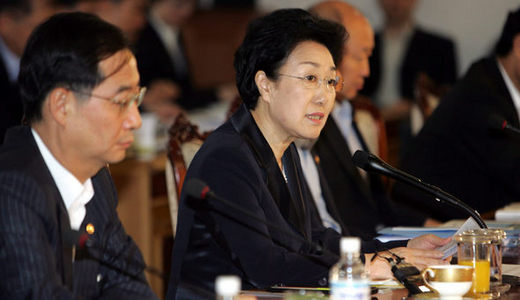Posted on : Jul.7,2006 10:42 KST
 |
|
Prime Minister Han Myeong-sook is presiding over the cabinet meeting.
|
Move goes against prior opposition to ’artificial’ stimulation
The South Korean government said it would steps to boost the economy by encouraging corporate spending and construction investments. The move comes after the government decided to spend the remaining budget for 2006, totaling 88.8 trillion won (90 billion USD), during the second half of the year.
The move is seen as the government’s answer to requests by the ruling Uri Party to exercise expansionary economic policies. The party is worried about their tenuous hold on the electoral base in the shadow of next year’s presidential election; a boost in the economy would in turn boost their standing, they reason.
However, there is controversy over the move because it stands in contrast to the Roh Moo-hyun administration’s prior stance, which had opposed the use of what it called "artificial economic stimulation."
On July 6, the government confirmed a set of expansionary measures for the second half of this year in a meeting chaired by Prime Minister Han Myeong-sook. One of the measures will call for the government to cut taxes for small- and medium-sized companies. In addition, the government will relax some restrictions for larger firms, including raising the in-house investment ceiling for family-run business conglomerates.
Steps will also be taken to reduce transaction taxes. In addition, to activate construction investment using private capital, the government will ease the investment cap for companies that plan to build corporation-oriented satellite cities. The government will also seek to build six privately-funded highways earlier than scheduled. Redevelopment projects in northern Seoul are expected to be accelerated, as well.
The government raised this year’s economic growth target rate to 5.1 percent from 5 percent. But the target for the government’s budget surplus this year was slashed to 4 billion USD from 15 billion.
In a meeting between the ruling Uri Party and top government officials on July 5, the party proposed a 16-point schedule of demands regarding the interest rate, the national financial situation, and deregulation within businesses and industries, and requested that the government exercise strong expansionary economic policies. The government has accepted most of the demands.
“It is rational pro-growth policy, not an artificial expansionary one,” said Finance and Economy Minister Han Duck-soo.
Many critics cited the fact that government spending for the second half of the year is 32 percent more than what it spent in the same time period a year ago. In addition, critics called the government’s plan to spend all of its annual budget an unprecedented one, equivalent to a new budget, in effect. Last year, the unspent annual budget totaled over 1 trillion won.
In particular, concern remains over a potential continued rise in land prices, as the government showed interest in supplying 15 million pyeong (49.6 million square meters) of land to build a total of 500,000 houses, including 280,000 homes in Seoul and its neighboring areas.
Businesses have welcomed the move. Lee Seung-chul, senior vice president of the Federation of Korean Industries, said, “The government’s willingness to employ expansionary economic policies, such as stabilization of the interest rate and efficient budget spending, will give a good signal to the market.”
However, civic groups and the Democratic Labor Party (DLP) raised concerns over the government’s measures. Rep. Shim Sang-jeong of the DLP said the adjustment of the investment ceiling, deregulation in the construction industry, and lowering of land ownership taxes for businesses will only help the country’s largest firms.
The People’s Solidarity for Participatory Democracy, a leading civic group, said the government’s moves would not turn public sentiment toward support of the Uri Party.

